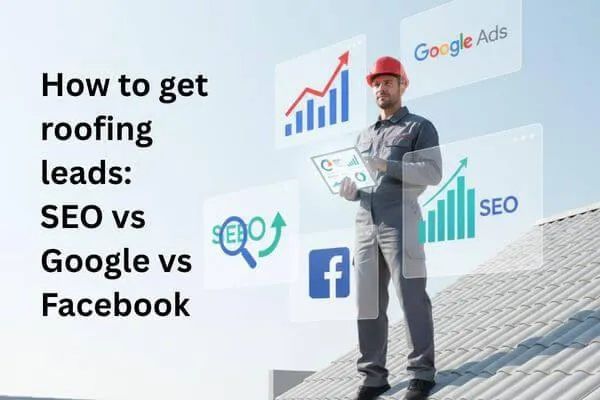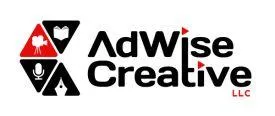
SEO vs Google Ads vs Facebook Ads: Best Way to Get Roofing Leads
How to Get Roofing Leads: SEO vs. Google Ads vs. Facebook Ads (2026)
Every roofer wants one thing — a steady stream of high-quality leads.
But between SEO, Google Ads, and Facebook Ads, it’s easy to feel lost. Each one promises results, yet they work in totally different ways. Some roofers spend thousands on ads and still come up dry. Others invest in SEO but get impatient waiting for results.
In this guide, you’ll see exactly how these three strategies stack up — what they cost, how fast they work, and which one brings the best roofing leads in 2026.
🔑 Key Takeaways
SEO brings long-term, high-quality leads once it’s built.
Google Ads generate fast results but cost more per lead.
Facebook Ads build awareness but attract lower-intent leads.
The best plan usually combines two channels, not one.
Tracking ROI is what separates pros from guessers.
What Counts as a Roofing Lead?
A roofing lead is any homeowner or business that reaches out for an estimate, quote, or inspection.
Simple, right? Not quite.
There’s a big difference between a lead and a qualified lead.
A Facebook message asking, “How much do you charge?” might never go anywhere.
A Google search for “roof replacement near me” usually means the person is ready to hire.
That’s why knowing where your leads come from — and how they behave — matters more than how many you get.
SEO for Roofing Leads — The Long Game

How SEO Gets You Roofing Leads
When someone searches “roof repair near me” or “roof replacement cost,” they’re ready to buy. Showing up at the top of Google is like owning the busiest street corner in town.
SEO gets you there.
It’s all about optimizing your website, your Google Business Profile, and your content so homeowners find you when they’re looking for help.
Simple steps like:
Adding service-area pages (“roof repair in Dallas,” “roof replacement Austin”)
Writing helpful blogs (“How much does a new roof cost in Texas?”)
Collecting reviews consistently
That’s what drives leads month after month.
Cost & Timeline
Plan on investing $1K–$3K per month if you’re serious.
Most roofers start seeing results in 3–6 months once content and backlinks kick in.
Pros & Cons
✅ Builds trust and authority
✅ Generates consistent, high-quality leads
❌ Takes time to ramp up
❌ Needs monthly maintenance
Bottom line: SEO wins in the long run. Once it’s built, it keeps working even when you’re not paying for ads.
Google Ads — Fast Leads (If You Can Pay for Them)

How It Works for Roofers
Google Ads place you at the top instantly. Searchers type “roof repair quote” or “emergency roof fix,” and your ad shows up first.
These leads are high intent — they’re actively searching for a roofer today.
Cost & ROI
Expect to pay $15–$35 per click depending on your market.
A well-built landing page converts 10–20% of clicks into real leads.
So yes — it’s expensive, but it’s predictable. You pay for placement and get immediate visibility.
Pros & Cons
✅ Instant leads
✅ Clear ROI tracking
❌ Can get expensive fast
❌ Requires tight ad management
Pro Tip: Always send traffic to a landing page, not your homepage. That one change alone can double your conversion rate.
Best use: Roofers who need leads fast — storm season, new market launch, or boosting cash flow.
Facebook Ads — Great for Awareness (Not Always Conversions)

How Roofers Use Facebook Ads
Facebook works best for staying top-of-mind.
You can target homeowners in your area, share before-and-after projects, or offer free inspection promos.
It’s also a great way to retarget people who’ve already visited your website or watched your videos.
Cost & ROI
Cost per click (CPC) is much lower — usually $1–$3.
But those clicks rarely turn into booked jobs right away. Facebook leads tend to be colder and need follow-up.
Pros & Cons
✅ Low cost per click
✅ Great for brand awareness
❌ Lower lead quality
❌ Needs strong follow-up to convert
Best use: Retargeting, awareness, and promoting referral programs.

Common Mistakes Roofers Make with Lead Generation
Most roofers don’t have a lead problem — they have a tracking problem.
Here are the biggest mistakes I see all the time:
Relying on one channel. Putting all your money into Google Ads means you’re renting traffic, not owning it.
Ignoring follow-up. Over 60% of roofing leads never get a second call or text.
Stopping SEO too soon. Many roofers quit just before rankings start climbing.
Failing to track ROI. Without tracking, you’re guessing which source works — and that’s how money gets wasted.
Fix these, and your marketing becomes more profitable even without increasing your budget.
Pro Tip — Track ROI Across All Channels
You can’t improve what you don’t measure.
Use a CRM like JobNimbus, AccuLynx, or GoHighLevel to tag each lead source.
When you can see where every booked job started — SEO, Google Ads, or Facebook — you’ll know exactly what to double down on.
Many roofers cut their marketing costs by 40% or more just by tracking properly.
FAQs: Roofing Lead Generation (2026)
Q1: What’s the cheapest way to get roofing leads?
Facebook ads and referrals are cheapest per click, but they often take longer to close. The best ROI usually comes from SEO once it’s built.
Q2: How much should roofers spend on marketing?
Most roofing companies spend 5–10% of annual revenue on marketing. If you’re under $1M/year, budget around $3K–$5K monthly across SEO and ads.
Q3: Which brings better leads — SEO or Google Ads?
Google Ads bring faster leads, but SEO produces higher trust and closing rates over time. The best mix depends on your cash flow and goals.
Q4: Can I run all three at once?
Yes — and you should, if your budget allows. Just make sure each channel is tracked properly so you know where booked jobs come from.
Q5: Do Facebook ads really work for roofing leads?
Yes — if your goal is awareness or retargeting. They rarely convert cold traffic, but they’re great for following up with people who visited your site or got a quote.
Q6: Is SEO still worth it in 2026?
Absolutely. With AI-driven search changes, organic trust is becoming even more valuable. Companies investing in SEO now will own the rankings others pay for later.
Recommended Tools to Track Roofing Leads

Google Analytics & Search Console – monitor SEO performance and keyword rankings
CallRail – record and tag calls by source (SEO, Ads, Facebook)
JobNimbus / AccuLynx / GoHighLevel – manage leads and see ROI by channel
Ubersuggest / SEMrush – track SEO keyword growth
These tools make it easy to see what’s working — and where your marketing dollars are wasted.
How to Combine SEO, Google Ads, and Facebook Ads Effectively
The roofers winning right now aren’t choosing between SEO or ads — they’re combining them.
Start with SEO as your foundation so homeowners can find you organically.
Use Google Ads to fill short-term gaps or target seasonal jobs like storm damage or emergency repairs.
Then, retarget those same visitors with Facebook Ads so they see your brand again and again.
That layered approach gives you the best of all three: visibility, trust, and follow-up.
It also spreads your risk — if ad costs rise or rankings dip, you’re still generating leads consistently.
Conclusion — The Smartest Way to Get Roofing Leads in 2026
Each platform has its place.
SEO builds trust and authority.
Google Ads create instant results.
Facebook Ads keep you visible and top-of-mind.
But the real magic happens when you tie them together with a plan.
If you’ve been trying to juggle everything yourself — ads, content, and tracking — it might be time to get expert eyes on your system.
💬 Feeling stuck?
Book a quick Content Creation Call — one hour with me turns into a full month of ready-to-go content that actually brings in leads.

